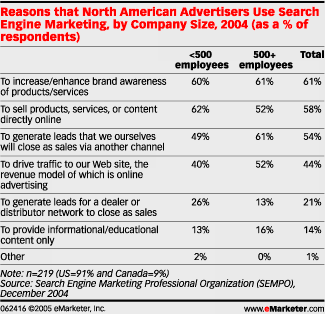Sourced from eMarketer
A new eMarketer report looks behind paid search advertising’s impressive numbers to reveal the dynamics that are driving growth.
“I think a lot of search and advertising professionals are going to be surprised,” says David Hallerman, eMarketer Senior Analyst and author of the report. “The good news is that the growth of paid search ad spending is flattening out,” he says. “Yes, you heard me right. That’s good news. In an industry once-burned by bubble-and-burst expansion, Internet advertising is best served when its most effective vehicles show steady, and less hyped growth.”
After several years of three-figure increases, and over 50% in 2004, spending jumps for paid search this year and in the years to follow will be in the healthy teens.
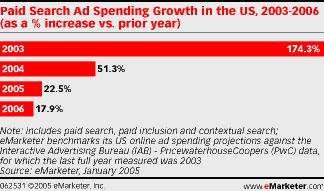
“As the paid search market matures,” says Mr. Hallerman, “involved companies will look for additional ways to build their bottom line through search. This will include greater spending on tools such as search engine optimization, which boosts organic search rankings, and broadening the paid search base with superior implementation of local search, contextual advertising, and vertical search.”
Things really get interesting when you look behind the numbers – to understand the clicker.
“Remember,” says Mr. Hallerman, “paid search is unlike any other form of advertising, whether online and offline. That’s because it’s the recipient of the ads-not the advertiser or the publisher-who determines if and when any ad becomes monetized. An advertiser can have the highest bids, and top ranking, for major keywords; and the search engine can be the most popular among Internet users. But until the consumer or businessperson clicks on the ad, no money exchanges hands.”
With such financial power in the hands of individuals, even if unwitting in most cases, it becomes essential to make them, and keep them, happy. But most advertisers have little idea what users really want from search, whether paid placement ads or natural listings, or how they use it.
From the consumer’s perspective, search engines are a vital part of their Internet experience. Nearly one-third of US adult Internet users told Pew Internet & American Life Project that they couldn’t live without search engines. Meanwhile, 50% of respondents said that while they like using search engines, they could go back to other ways of finding information.
One suspects that if search engines actually disappeared from the Internet, many among that 50% group would switch replies to “couldn’t live without.”
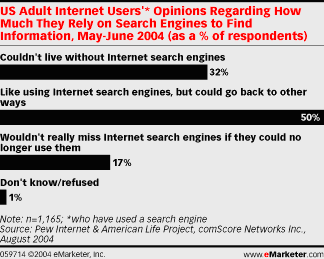
That users tend to be highly satisfied with their search engine experience is supported by research showing that 89% have had a “strongly positive” experience with Google, and 68% say the same about Yahoo!. Even if fewer respondents feel just as strongly about other search engines such as Ask Jeeves and MSN, that doesn’t mean their experience hasn’t been positive.
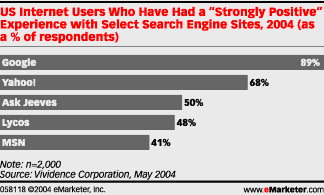
One factor sustaining the growth of paid search comes back to its unique position among advertising: the user’s control. A noteworthy survey from Yankelovich last year, regarding US consumer’s attitudes toward marketing and advertising, found that 61% feel the amount of marketing and advertising is out of control.
Since users can react to or ignore search engine ads, at will, that greater control encourages greater responsiveness to relevant ads. Relevancy is also key, since 59% of respondents feel that most marketing and advertising has very little relevance to them.
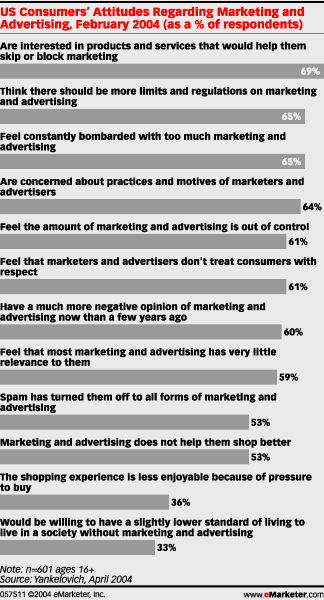
From the advertiser’s point of view, the key reasons for using search engine marketing include selling products, services, or content online (at 58% total); generating leads (at 54%); and, perhaps surprisingly – considering the direct response nature of most search marketing – to increase or enhance brand awareness (at 61%).
